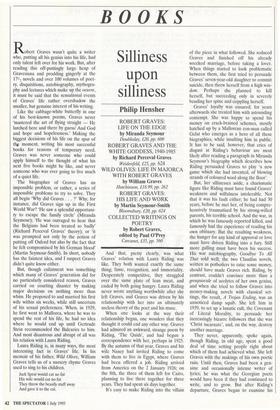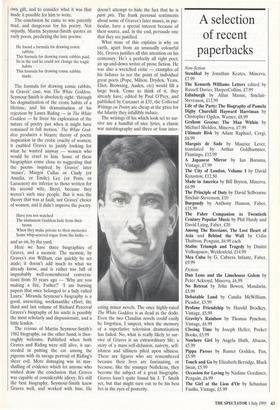BOOKS
Silliness upon silliness
Philip Hensher
ROBERT GRAVES: LIFE ON THE EDGE by Miranda Seymour Doubleday, £20, pp. 600 ROBERT GRAVES AND THE WHITE GODDESS, 1940-1985 by Richard Perceval Graves Weidenfeld, £25, pp. 624 WILD OLIVES: LIFE IN MAJORCA WITH ROBERT GRAVES by William Graves Hutchinson, £18.99, pp. 262 ROBERT GRAVES: HIS LIFE AND WORK by Martin Seymour-Smith Bloomsbury, £20, pp. 624 COLLECTED WRITINGS ON POETRY by Robert Graves, edited by Paul O'Prey Carcanet, £35, pp. 560 Robert Graves wasn't quite a writer who, putting all his genius into his life, had only talent left over for his work. But, after reading this off-puttingly large heap of Gravesiana and prodding gingerly at the 171/2 novels and over 100 volumes of poet- ry, disquisitions, autobiography, mythogra- phy and lectures which make up the oeuvre, it must be said that the sensational events of Graves' life rather overshadow the smaller, but genuine interest of his writing.
Like the cabbage-white butterfly in one of his best-known poems, Graves never `mastered the art of flying straight — He lurched here and there by guess/ And God and hope and hopelessness.' Making the biggest decisions of his life on the spur of the moment, writing his most successful books for reasons of temporary need, Graves was never someone who could apply himself to the thought of what his next five books might be like, and never someone who was ever going to live much of a quiet life.
The biographer of Graves has an impossible problem, or rather, a series of impossible problems to try to solve. They all begin 'Why did Graves . . . ?' Why, for instance, did Graves sign up in the First World War? 'He saw a splendid opportuni- ty to escape the family circle' (Miranda Seymour); 'He was outraged to hear that the Belgians had been treated so badly' (Richard Perceval Graves' theory); or 'it was prompted not only by the notion of putting off Oxford but also by the fact that he felt compromised by his German blood' (Martin Seymour-Smith). In short, nobody has the faintest idea, and I suspect Graves didn't quite know either.
But, though enlistment was something which many of Graves' generation did for no particularly considered reason, Graves carried on courting disaster by making major decisions on nothing more than whim. He proposed to and married his first wife within six weeks, while still uncertain of his sexual preferences. When, in 1929, he first went to Mallorca, where he was to spend the rest of his life, he had no idea where he would end up until Gertrude Stein recommended the Balearics to him. And most disastrous and abrupt of all was his relation with Laura Riding.
Laura Riding is, in many ways, the most interesting fact in Graves' life. In his memoir of his father, Wild Olives, William Graves tells us of a nursery rhyme Graves used to sing to his children.
Jack Sprat would eat no fat His wife would eat no fat They threw the beastly stuff away And gave it to the cat.
And that, pretty clearly, was what Graves' relation with Laura Riding was like. They both wanted exactly the same thing; fame, recognition, and immortality. Desperately competitive, they struggled over the same plate of lean meat, and ended by both going hungry. Laura Riding never wrote anything worthwhile after she left Graves, and Graves was driven by his relationship with her into an ultimately useless theory of the poet and his muse.
When one looks at the way their relationship began, one wonders that they thought it could end any other way. Graves had admired an awkward, strange poem by Riding, The Quids', and had begun a correspondence with her, perhaps in 1925. By the autumn of that year, Graves and his wife Nancy had invited Riding to come with them to live in Egypt, where Graves had been offered a job. Riding arrived from America on the 2 January 1926; on the 8th, the three of them left for Cairo, planning to live there together for three years. They had spent six days together.
It's easy to make Riding into the villain of the piece in what followed. She seduced Graves and finished off his already wrecked marriage, before taking a lover. When things started to look problematic between them, she first tried to persuade Graves' seven-year-old daughter to commit suicide, then threw herself from a high win- dow. Perhaps she planned to kill herself, but succeeding only in severely bending her spine and crippling herself.
Graves' loyalty was ensured; for years afterwards she treated him with astounding contempt. She was happy to spend his money on crack-brained schemes, mostly hatched up by a Mallorcan con-man called Gelat who emerges as a hero of all these biographies, while insulting him in public. It has to be said, however, that cries of disgust at Riding's behaviour are most likely after reading a paragraph in Miranda Seymour's biography which describes how Riding persuaded Graves to play 'a new game which she had invented, of blowing strands of coloured wool along the floor'.
But, her sillinesses aside, a charismatic figure like Riding must have found Graves' weakness and wilfulness intolerable. Not that it was his fault either; he had had 30 years, before he met her, of being compre- hensively traumatised by his strong-willed parents, his terrible school. And the war, in which he was famously reported killed, and famously had the experience of reading his own obituary. But the resulting weakness, the hunger for any kind of approval or love must have driven Riding into a fury. Still more galling must have been his success. His war autobiography, Goodbye To All That sold well; the two Claudius novels, written as potboilers to raise some money, should have made Graves rich. Riding, by contrast, couldn't convince more than a groupuscule of acolytes of her own genius, and when she tried to follow Graves into money-making novels with classical set- tings, the result, A Trojan Ending, was an unnoticed damp squib. She left him in 1939, to set up a lunatic cult, the Covenant of Literal Morality, to persuade her increasingly bizarre followers that she was `Christ incarnate', and, on the way, destroy another marriage.
They never, apparently, spoke again, though Riding, in old age, spent a good deal of time setting people right about which of them had achieved what. She left Graves with the makings of his own poetic ruin. Until then, Graves had been a gen- uine and occasionally intense writer of lyrics; he was what the Georgian poets would have been if they had continued to write, and to grow. But after Riding's departure, Graves began to examine his Own gift, and to consider what it was that made it possible for him to write.
The conclusion he came to was patently mad, and dangerous for his poetry. Not unjustly, Martin Seymour-Smith quotes an early poem, predicting the late poems:
He found a formula for drawing comic rabbits: This formula for drawing comic rabbits paid, So in the end he could not change the tragic habits This formula for drawing comic rabbits made.
The formula for drawing comic rabbits, in Graves' case, was The White Goddess. Seymour-Smith is absolutely right: 'through his dogmatisation of the erotic habits of a lifetime, and his dramatisation of his rejection by Laura Riding — in The White Goddess — he froze his exploration of the nature of poetry just when it might have remained in full motion.' The White God- dess produces a bizarre theory of poetic inspiration in the erotic cruelty of women; it enabled Graves to justify looking for what he wanted anyway — women who would be cruel to him. Some of these biographies come close to suggesting that the poems inspired by Graves' later 'muses', Margot Callas or Cindy (or Amalia, or Emile) Lee (or Potts, or Laracuen) are inferior to those written for his second wife, Beryl, because they weren't such nice people. But it was the theory that was at fault, not Graves' choice of women, and it didn't improve the poetry.
Have you not watched The immanent Goddess fade from their brows
When they make private to their mysteries Some whip-scarred rogue from the hulks -
and so on, by the yard.
Here we have three biographies of Graves, and a memoir. The memoir, by Graves's son William, can quickly be set aside; it doesn't add much to what we already know, and is rather too full of improbably well-remembered conversa- tions from 50 years ago — 'Why are you making a fire, Father?' I am burning papers that once belonged to a lady called Laura.' Miranda Seymour's biography is a good, unexciting, workmanlike effort; the third and last volume of Richard Perceval Graves's biography of his uncle is possibly the most scholarly and dispassionate, and a little leaden.
The reissue of Martin Seymour-Smith's 1982 biography, on the other hand, is thor- oughly welcome. Published when both Graves and Riding were still alive, it suc- ceeded in putting the cat among the pigeons with its savage portrait of Riding's sheer evil. More damaging was its mar- shalling of evidence which let anyone who wished draw the conclusion that Graves was capable of considerable idiocy. It's still the best biography; Seymour-Smith knew Graves well, and worked with him. He
doesn't attempt to hide the fact that he is parti pris. The frank personal sentiments about some of Graves's later muses, in par- ticular, have a special interest because of their source, and, in the end, persuade one that they are justified.
What none of this explains is why on earth, apart from an unusually colourful life, Graves justifies all this attention on his centenary. He's a perfectly all right poet; an up-and-down writer of prose fiction. He was also a wretched critic — examples of his failures to see the point of individual great poets (Pope, Milton, Dryden, Yeats, Eliot, Browning, Auden, etc) would fill a large book. Come to think of it, they already have; edited by Paul O'Prey, and published by Carcanet at £35, the Collected Writings on Poetry are cheap at the price for the hilarity they infallibly induce.
The writings of his which look set to sur- vive are a handful of nice lyrics, a classic war autobiography and three or four inter-
esting minor novels. The once highly-rated The White Goddess is as dead as the dodo. Even the two Claudius novels could easily be forgotten, I suspect, when the memory of a superlative television dramatisation has faded. No, what is really likely to sur- vive of Graves is an extraordinary life; a story of a mass self-delusion, naivety, self- ishness and silliness piled upon silliness. There are figures who are remembered because their lives are fascinating, or because, like the younger Nollekens, they become the subject of a great biography. Graves hasn't quite found his J. T. Smith yet, but that might turn out to be his best bet in the eyes of posterity.



































































 Previous page
Previous page